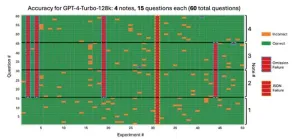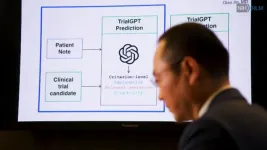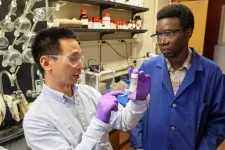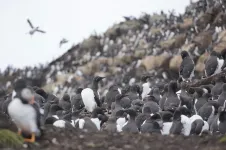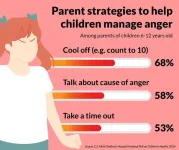(Press-News.org) A new study, focused on a remote region of the Peruvian Andes where the waters of the Amazon originate, carries lessons for hydropower operators and farming communities worldwide: collaborating on sustainable land management is the best decision they can make for the long-term viability of their businesses and livelihoods. It also opens opportunities for restoration of degraded ecosystems. Research from the Stanford-based Natural Capital Project (NatCap) in Communications - Earth & the Environment integrates hydropower operations with watershed processes and climate projections in a novel, high-resolution modeling approach for the Huallaga River Basin, upstream of the Chaglla Dam. It provides a detailed picture of how climate change will increase water shortages, and points to investments in upstream reforestation and sustainable irrigation as the most effective paths toward meeting these challenges.
“This study is exciting because this is the first time climate change, hydropower, and land management practices have been put together in a robust decision-making approach,” said Zhaowei Ding, a postdoctoral researcher at NatCap and lead author on the paper. “In this region, people had looked at the relationship between hydropower and deforestation, or hydropower and food, but they were not connected. Now, we can show where water goes in the basin and we can optimize our management suggestions.”
Climate-induced water shortages turn up the pressure
Despite serious social and environmental impacts, hydropower remains an important source of low-carbon energy in many parts of the world, including Latin America and Asia. However, hydropower dams cannot operate below a certain threshold of water flow. Reduced rainfall resulting from climate change will exacerbate the problem. So too will less rain during the growing season. Farmers upstream of hydropower plants will increasingly turn to irrigation to ensure their livelihoods, reducing the water available downstream. These changes will likely exacerbate conflict between the energy and agricultural sectors.
Waldo Lavado, a co-author and researcher at the National Service of Meteorology and Hydrology of Peru, noted that water resources in the Peruvian Andean-Amazonian basin are quite vulnerable to changes in land use and to climate change. “For the first time, this research scientifically documents possible projections of these changes – the first step to understanding the water-energy-food-ecosystem nexus in Peruvian basins with increasingly marked human influences.”
The researchers analyzed thousands of possible land and water use scenarios and found no win-win solutions for resolving tensions between water, energy, food, and ecosystems. Unplanned expansion of irrigation in this region could strongly impede the hydropower plant’s ability to function in the dry season, when hydropower is most valuable for the Peruvian power grid. At the same time, thousands of small-scale producers have long relied on rainfed agriculture for their food security and livelihoods, and for contributing to the national market. In this context, irrigation helps farmers mitigate increasing uncertainty.
Nature offers damage control
Nonetheless, the study found that impacts to both the energy and food sectors could be lessened using nature-based approaches. Investments in upstream reforestation and the creation of protected areas, by compensating farmers to plant trees instead of crops, would increase water availability for downstream hydropower by reducing irrigation needs. Forests also help retain soil, so this would lessen erosion and sedimentation, which impede dam operations. The modeling helped identify low-yield areas where farms use a lot of water for irrigation but aren’t producing similarly large crops – potentially prime locations for making this switch. This approach could be combined with investments in irrigation efficiency, like drip irrigation systems, in remaining crop production areas to maintain or increase local food production.
“This type of information can contribute to local stakeholders’ decision-making processes around development,” said Andrea Baudoin Farah, assistant professor at Colorado State University, former postdoctoral researcher with NatCap, and a co-author of the paper. “Local farmers and communities are well aware of the need to preserve the ecosystems and landscapes that sustain their production systems, but they face significant challenges in a changing environment.”
Baudoin Farah noted that Andean peasant communities have deep knowledge of the interconnections between ecosystems and food production, despite being historically relegated to the steepest, most marginal lands, and neglected in terms of supportive infrastructure. “Climate change is exacerbating their already-vulnerable livelihoods. Studies like this one point to the need to channel funds to support farmers in their efforts to conserve soils and implement sustainable production systems.”
Scaling the approach in other regions
“This study shows that natural capital approaches, in this case like investing in ecosystems to secure water supplies and reduce sedimentation, are the main lever at this nexus of food, energy, climate, and water,” said Tong Wu a senior scientist & associate director of the NatCap China Program, which collaborated on this research. “They are like the router through which all the different cables go through. It’s not just one solution – it’s the best solution.”
The researchers hope the study’s findings can motivate dialogue between hydropower operators and upstream stakeholders across Latin America. The largest dams in the world are located in Asia, so they are also engaged in ongoing conversations with key actors in the hydropower sector there about scaling up this nature-based approach to addressing the water crisis that is headed their way.
With climate change, the value of water will be higher and competition for it will be stronger. “If hydropower operators want to maintain their revenue, they will need to increase their investments in nature upstream of their dams,” said study senior author Rafael Schmitt, a lead scientist at NatCap and project lead.
“Our team’s modeling framework is an important step forward in defining eco-compensation mechanisms – like paying farmers not to farm, or where to implement protected areas – in a way that is science-based and robust, despite the great uncertainties introduced by future climate change,” Schmitt added.
The Natural Capital Project is based out of the Stanford Doerr School of Sustainability and its Woods Institute for the Environment, and the Stanford School of Humanities and Sciences. Other Stanford co-authors are Héctor Angarita, Jesse A. Goldstein, Natasha Batista, and Dave Fisher, all based at NatCap. Additional co-authors are Christian Montesinos Cáceres from the National Service of Meteorology and Hydrology of Peru (Servicio Nacional de Meteorología e Hidrología) and Hua Zheng with the Chinese Academy of Sciences.
This research was funded by the Moore Foundation.
END
Keeping the lights on and the pantry stocked: Ensuring water for energy and food production
2024-11-18
ELSE PRESS RELEASES FROM THIS DATE:
Parkinson’s Paradox: When more dopamine means more tremor
2024-11-18
Researchers from the Champalimaud Foundation shed light on the puzzling relationship between dopamine and rest tremor in Parkinson’s disease, finding that preserved dopamine in certain brain regions may actually contribute to tremor symptoms, challenging common beliefs.
Parkinson's disease (PD) is a progressive neurological disorder known for its characteristic motor symptoms: tremor, rigidity, and slowness of movement. Among these, rest tremor—a shaking that occurs when muscles are relaxed—is one of the most recognisable yet least understood.
A new study from the Champalimaud ...
Study identifies strategy for AI cost-efficiency in health care settings
2024-11-18
New York, NY [November 18, 2024]—A study by researchers at the Icahn School of Medicine at Mount Sinai has identified strategies for using large language models (LLMs), a type of artificial intelligence (AI), in health systems while maintaining cost efficiency and performance.
The findings, published in the November 18 online issue of npj Digital Medicine [DOI: 10.1038/s41746-024-01315-1], provide insights into how health systems can leverage advanced AI tools to automate tasks efficiently, saving time and reducing operational costs while ensuring these models remain ...
NIH-developed AI algorithm successfully matches potential volunteers to clinical trials release
2024-11-18
Researchers from the National Institutes of Health (NIH) have developed an artificial intelligence (AI) algorithm to help speed up the process of matching potential volunteers to relevant clinical research trials listed on ClinicalTrials.gov. A study published in Nature Communications found that the AI algorithm, called TrialGPT, could successfully identify relevant clinical trials for which a person is eligible and provide a summary that clearly explains how that person meets the criteria for study enrollment. The researchers ...
Greg Liu is in his element using chemistry to tackle the plastics problem
2024-11-18
As an undergraduate student at Zhejiang University in eastern China, Greg Liu went with some of his classmates on a university-sponsored trip to tour a host of chemical industries within the area.
The tour gave students pursuing degrees in chemical engineering an opportunity to learn more about the manufacturing and production processes of chemicals within China at the time. Liu realized that day exactly what he wanted to do for a career – find ways to alleviate or stop the industry from polluting the environment.
“I realized that this was not going to be the sustainable way of our future. Pollution ...
Cocoa or green tea could protect you from the negative effects of fatty foods during mental stress - study
2024-11-18
University of Birmingham News Release
STRICTLY EMBARGOED UNTIL Monday 18th November 2024 8.00am UK/ 3.00am EST
Cocoa or green tea could protect you from the negative effects of fatty foods during mental stress - study
New research has found that a flavanol-rich cocoa drink can protect the body’s vasculature against stress even after eating high-fat food.
Food choices made during periods of stress can influence the effect of stress on cardiovascular health. For example, recent research from the University of Birmingham found that high-fat foods can negatively affect vascular function and oxygen delivery to the brain, meanwhile flavanol compounds found in abundance in cocoa ...
A new model to explore the epidermal renewal
2024-11-18
The mechanisms underlying skin renewal are still poorly understood. Interleukin-38 (IL-38), a protein involved in regulating inflammatory responses, could be a game changer. A team from the University of Geneva (UNIGE) has observed it for the first time in the form of condensates in keratinocytes, the cells of the epidermis. The presence of IL-38 in these aggregates is enhanced close to the skin’s surface exposed to atmospheric oxygen. This process could be linked to the initiation of programmed ...
Study reveals significant global disparities in cancer care across different countries
2024-11-18
A recent analysis reveals striking disparities in the cost and availability of cancer drugs across different regions of the globe, with significant gaps between high- and low-income countries. The findings are published by Wiley online in CANCER, a peer-reviewed journal of the American Cancer Society.
The analysis, which drew on relevant published studies and reviews related to cancer and the availability of cancer treatments, predicts that there will be an estimated 28.4 million new cancer cases worldwide in 2040 alone. In the coming years, cancer incidence is expected to increase most significantly in low-income countries. Cancer mortality ...
Proactively screening diabetics for heart disease does not improve long-term mortality rates or reduce future cardiac events, new study finds
2024-11-18
While coronary heart disease and diabetes are often seen in the same patients, a diagnosis of diabetes does not necessarily mean that patients also have coronary heart disease, according to a new study from researchers at Intermountain Health in Salt Lake City.
The Intermountain study found that proactively screening patients with diabetes 1 and 2 for coronary heart disease who have not shown symptoms of heart problems does not improve long-term mortality rates, nor does it lower the chance of them ...
New model can help understand coexistence in nature
2024-11-18
Different species of seabirds can coexist on small, isolated islands despite eating the same kind of fish. A researcher at Uppsala University has been involved in developing a mathematical model that can be used to better understand how this ecosystem works.
“Our model shows that coexistence occurs naturally when species differ in their ability to catch fish and to efficiently fly long distances to the area where they catch fish,” says Claus Rüffler, Associate Professor of Animal Ecology at Uppsala University.
Seabirds can breed in very large colonies, sometimes consisting of several hundred thousand pairs. Ecologists working ...
National Poll: Some parents need support managing children's anger
2024-11-18
ANN ARBOR, Mich. – Many parents are all too familiar with angry outbursts from their children, from sibling squabbles to protests over screen time limits.
But some parents may find it challenging to help their kids manage intense emotions. One in seven think their child gets angrier than peers of the same age and four in 10 say their child has experienced negative consequences when angry, a new national poll suggests.
Seven in 10 parents even think they sometimes set a bad example of handling anger themselves, according to the University of Michigan Health ...

